- Home
- Arthur Miller
Presence: Stories Page 4
Presence: Stories Read online
Page 4
“Be a man,” Papa said, buckling his belt again, and he went to the sideboard and filled a tiny glass with whisky and carried it over to the rocker by the window and, with a sigh, sat down.
The tablecloth and silverware sparkled. Martin noticed suddenly that Ben had gone out of the room, and he wondered if he had gone outside to cry. This wasn’t finished yet, he knew.
Papa raised his glass toward the kitchen and said, “Well? A New Year!”
Mama called out from the stove, “Mit glick!” And she closed her eyes for an instant. Martin never made any noise at these times because they were addressing some unseen ear.
Papa swallowed the glassful in one gulp and exhaled. “I tell you,” he said toward the kitchen doorway, “that cantor is a horse.” Martin saw the cantor with his long beard harnessed to the milkman’s wagon. “Never sat down all day. The man didn’t stop for five minutes.”
“Because he’s not one of those fakers. He’s a religious man.”
“Well, say,” Papa grudgingly agreed, “he’s got all year to rest up.”
“Oh, stop that.”
“If I had two days’ work a year I’d stand up too.” Martin saw the warm humor in his father’s eyes, his peaceful blinking.
“What are you talking about?” Mama said. “They could drop dead that way, singing all day with nothing in their bodies, not even a glass of water.”
“He won’t drop dead,” Papa said. He always knew the evenness of things, Martin felt, the real way it always was going to turn out, and he prayed to be good. “His boss takes good care of him.”
“Don’t be so smart,” Mama said, and she raised her eyebrows and closed her eyes for a second to ask God to pay no attention to what He had just heard.
“I wouldn’t mind that either—a two-day year.”
“That’s enough already,” Mama said with a little unwilling smile. She brought in Papa’s big, gold-bordered soup plate filled with yellow chicken soup in which matzoh balls floated. “Eat,” she said and returned to the kitchen.
Papa got up and hoisted up his pants, letting out his long brown belt two holes. Quickly Martin went to his place, climbed onto his chair, and put his skullcap on. Papa sat down at the head of the table and put his cap on. Mama brought Ben’s soup and went back into the kitchen.
“Who’s his boss?” Martin asked.
“Who?”
“The cantor’s.”
Papa shrugged. “God. Who knows?” Then, dipping his spoon into his soup, he stirred it and mumbled a prayer.
“Does he see God?” Martin asked. The hope was flying through his heart that the cantor and possibly Papa too had seen the beard in the ocean, and then he would be able to tell how he also had seen it floating there, and with this secret wiped out it would somehow take all secrets with it.
“Where’s Ben?” Papa asked. The spoon was not quite to his lips.
Mama instantly came out of the kitchen. “Why? Where’s Ben?” She looked at Martin with alarm, and his mouth hung open and he blushed.
“I don’t know. I didn’t do anything to him,” he said.
“Ben?” Mama called, hurrying to the bedroom and looking in. “Ben?”
Papa watched her, his spoon still raised and dripping. “Take it easy, for God’s sake,” he said, irritated. But he was awakening to trouble too, and Martin felt alarmed that he maybe had done something to Ben which he had forgotten.
“What do you mean?” she said indignantly. “He’s not in here!” And she hurried to the bathroom and found the door locked. “Ben? Ben!” she commanded an answer in fright, and with a shock Martin saw what a loss Ben would be.
The turning of the lock was heard, and the door opened. Ben came out, his hair wet and freshly combed, his blue tie still in place even though Papa had taken his off. Martin saw the hurt in his brother’s face and that he was still not looking at him and that he had been crying for Mama’s sake as a good son should.
“There!” Papa said. “Now what’ve you got to cry about?” And he gulped his soup, spoonful after spoonful.
“I thought something happened,” she queried Ben.
“I was just in the bathroom,” Ben said, his voice husky.
“Why didn’t you report to her that you were going to the bathroom?” Papa said.
“All right, all right,” Mama warned.
Ben tried to smile and sat down in his place.
“If you don’t report,” Papa went on, “you might’ve got killed—”
“Stop it,” Mama said, grinning and angry.
“You could’ve got run over. After all, there’s a lot of traffic in this house.”
“Will you stop it?” she asked him, losing her grin.
“Place is full of trucks,” Papa continued, as he ate his soup. “Person should ask her permission before they go to the bathroom.” Then he looked up at her and shook his head, ready to laugh. “I’m telling you, young lady—” He broke off with a weary laugh and went back to his soup.
Ben adjusted his satin cap on his head and stared meaningfully at the silver centerpiece, which was full of fruit, and Papa stopped eating. Now there was quiet. “Boruch ahto adonai . . .” Ben monotoned, and without faltering or moving at all he went into the blessing. Mama stood there listening in the doorway, caught by his gravity, her hands clasped together, her face raised toward the air overhead, where Martin knew her secret wishes floated, aroused to life by Ben’s power of prayer and his immaculate memory, which never left out a single holy word. Martin pressed one ear against his head, pretending he had a slight itch, while Ben continued unswervingly to the prayer’s end. Only then did Papa resume eating and Ben, without rushing to break his terrible fast, selected his spoon, stirred his soup so long that it seemed he was even reluctant to eat at all, and finally he ate in grief. Mama took his grave permission to move and went silently into the kitchen and in a moment came out with her plate and sat down opposite Papa.
Martin’s hand was still sticky from the salt water with which he had cleaned off his shoe, but he knew it was invisible, and he drank his soup, his chin just clearing the rim of his bowl. It was quiet in the room. He drew the soup through his lips with the same soft sound his father made, sniffing the way Papa did after each swallow. Now he calculated his matzoh ball. The edge of the spoon had to cut it exactly down the middle or it would slip out from under, spring out of the bowl, and his hand would come down sharply and spill the soup. He set the edge of his spoon on top of the matzoh ball, knowing his mother was watching him from the end of the table. With his left hand gripping the bowl he started to press down. The matzoh ball began to slide under the pressure.
“Martin,” his mother began, “let me—”
Surprised at his own sharpness, he shot back, “I can do it!” Ben seemed stabbed but said nothing. Papa glanced up but went on eating.
He lifted his spoon and set its edge on the hard-packed ball again, slightly to one side of the previous mark. He knew that now Papa and Ben were also watching, even though they were not looking up. His face was getting rigid and red, his raised elbow trembling with his effort as he started to press down to cut the ball. Again it began to slide, but he knew that sometimes a sudden, swift, downward push could slice through before it flew out of the bowl, although sometimes this only sent it spinning out onto the table or into his lap. He hesitated, struggling with his dignity, which might collapse if he should start still a third cut, and he was about to raise the spoon to try again when he saw his mother’s hand reaching toward his own to take the spoon away.
With all his might and anger he pushed the spoon down, drawing together his powers of mystic command to make the matzoh ball stand still and obey as it did for Papa and Ben, and at the same instant Mama’s hand grabbed his. The ball shot out of the bowl and his hand banged down on the bowl’s edge. The soup first warmed, then suddenly burned into his thigh
s through his good tweed pants, the smoky smell of wet wool alarming his nostrils. Out of the screaming he heard Ben’s yell—the ball had toppled one of the candles into Ben’s wine and he had knocked over the glass trying to save it. The tablecloth was bleeding through a red wound spreading down its middle. Martin was jumping up and down, hitting his hands against his burning thighs and trying at the same time to keep his mother’s hands away from him, for she was trying to loosen his belt in order to get his pants off.
“You made me do it!” he screamed at her.
“He’s burning! Get your pants off!” she yelled.
Ben was now in front of him, pulling at his pants to lower them. This further indignity infuriated him. “Don’t do that!” he screamed, but he could feel his pants being drawn down past his hips and he kicked out. Mama gasped, and Ben fell back to a sitting position on the floor. It was quiet. From somewhere up high he could hear Papa’s reedy, questioning voice.
Mama was straightening up, her hand cupping one of her breasts, her alarmed eyes looking into the future over Martin’s head. He heard the ocean booming as if it were underneath the floor and felt the house trembling as the waves struck. Papa, murmuring questions, followed Mama into their bedroom. Her breath was coming in short gasps. The door closed.
Ben stood facing the closed bedroom door. Fright and concern were rigid in his eyes.
“Why is she that way?” Martin asked softly.
“You kicked her!” Ben shouted in a whisper, glancing at Martin with contempt, then turned back to the door to listen.
Martin had no memory of kicking her. He knew he had kicked, but he had not hit anything, he thought. But it was impossible to explain, and shame gathered in him, and he saw a blackened sky.
“Pa?” Ben called softly through the door. There was no answer, and Ben’s breathing quickened, close to sobbing, as he listened. Now Ben turned down to his brother, disbelief and disgust in his face. “How could you ever say that to her?”
“What?”
“What you said. You don’t need her any more. To your own mother!”
Martin sobbed aloud but softly, standing there.
“You have to go to her and apologize. You have to beg her pardon,” Ben said, as though Martin did not know anything at all about behaving. “Did you even apologize?”
Martin shook his head, sobbing.
“You didn’t even apologize?”
Martin wept, covering his face with his hands. He wept because he had hurt his mother and did not understand anything and was alone outside the circle of a fine family. His pants were getting cold now.
“Pa?” Ben called again, more insistently now. Then he carefully turned the knob and peeked inside. “Pa?” he asked. Papa’s deeper voice spoke from within, and Ben entered the room, closing the door behind him. Martin listened for any sound of the window being opened and all of them climbing out to leave him forever. But they were still talking in there.
He waited. His soup bowl lay overturned on the floor; the wreckage of the table seemed to make a screeching, disorderly noise at him; one candle still burned its holy light while the wick of the other lay in Ben’s overturned glass, and all the chairs stood facing in odd directions. He took a step toward his bowl to pick it up, but his thigh touching his cold wet pants stopped him, and he busied himself trying to re-form the vanished crease. Again he tried to walk, but the coldness of the tweed clinging to his skin disgusted him and brought tears to his eyes. It was like waking up between wet sheets, and it brought the same resentment and mystification into his heart. Vaguely he felt it was his mother’s fault, and he felt stronger, having blamed her, and walked stiff-legged into his and Ben’s room.
Using his fingertips, he unbuttoned his pants and let them down, then sat on the floor to slip them over his shoes. They smelled like a wet dog. He stood up, trying to decide what to do with them, and he started to cry. He went about the room crying softly, the pants hanging heavily from his fingertips. He draped them over the back of the only chair in the room and stepped away, but their weight pulled them down to the floor. Then he started to lay them on his bed but feared they would wet the blanket; he had not wet his bed in a long time, maybe two weeks ago or a month or three months, and he did not want to give them any new ideas now. He crossed the room to the closet, but the hangers were impossibly high; and, besides, he vaguely recalled a time when he had been scolded for having put his wet bathing suit in the closet. Standing there sobbing softly, he looked around the room for a place to leave his pants, and a hand seemed to reach in and squeeze his stomach. “Ma!” he called softly, careful not to let his call penetrate the wall to her room. But he was really crying now, and in raising his hands to wipe his eyes he dropped the pants on the floor; he looked at them there and, giving himself up to his fate, walked out into the living room.
The bedroom door was still shut. He walked over to it, still sobbing, and said, “Ma?” and tried to stifle his sobs in order to hear. But it was silent in there now. They had left him! “Mama!” he called louder and stamped his foot. Maybe they had wet his pants so he would go into his bedroom, giving them time to get away. For the first time in his life he did not dare turn the doorknob without first hearing permission; he dared not open it and find an empty room. He banged on the door, calling his mother, his shouts blinding him. A sudden rage flung itself up into his head, the way the ocean sometimes spews a wave deep onto the beach. “I didn’t kick that baby!” he yelled, the skin on his temples crawling, “I didn’t see it!”
As though in reply a chair scraped angrily inside the room and the door opened, and Martin was already half across the living room in flight. Papa appeared in the doorway. His fair face was darker than Martin had ever seen it. He was frowning, with no trace of a smile even in his eyes. It was no joke. He looked down at Martin. He was going to say, “Nobody’s ears stick out in this family but yours! Nobody in this family stands around trying to see the beard in the ocean! Nobody peeks through his fingers at the cantor dancing in his white socks! Nobody goes around with his shoelaces opening all the time and throwing matzoh balls all over the clean tablecloth and wetting his pants from McCreery’s and making up about dentists! And nobody knows anything about babies! Nothing is happening at any time in this house, Martin!”
And then Martin would disappear. He saw, with great relief, how he would vanish, like that time when he had accidentally turned the electric fan on the egg-white his mother had whipped, and it flew off the dish into the air and was not there any more. He would always be around watching, but they would not see him, and he could sit with his mother or Papa or lie down between them in bed on Sunday mornings the way he used to, and they wouldn’t know.
“Sit down,” his father said, partly to him and partly to Ben, who was coming out of the bedroom, red-eyed.
Martin went and picked his bowl off the floor, carefully avoiding the puddle, and set it neatly at his place and climbed up onto his chair. Everything was far away. Ben sat at his place, righted his wineglass, and put back the fallen candle in its silver holder, handling it as though it stood for his mourning. But Papa, instead of sitting, went into the kitchen. Martin could hear dishes being moved in there. Ben stared down at the red gash in the tablecloth. Mama’s empty chair twisted Martin’s heart, and he began to sob softly again, trying not to attract either sympathy or blame or any notice at all. Papa came out of the kitchen and gave them each a plate of chicken piled on top of the peas and carrots. Martin never ate white meat but he did not complain. In a moment Papa came out again with his own plate and sat down.
Martin ate through his sobs, but the chicken was being wetted by his tears, the water from his cold nose, and the saliva flowing loosely inside his mouth. Papa reached into his back pocket, drew out his great handkerchief, and reached over and held it under Martin’s nose. It was warm. He blew. “Again,” Papa said. Martin’s pleasure started his sobs pulsating again, but he adam
antly controlled himself and blew for Papa’s sake.
“Should I cut your chicken?” Papa asked.
Martin hesitated; Papa’s newly respectful tone freshened his memory of the pain he had caused him, his treason, and he did not want to go even further now and turn down his kindness. But he could not bear the injustice of having his chicken cut when Ben was cutting his so easily. “I can do it, Papa,” he whispered apologetically.
“Okay. Be a man.”
Papa ate rapidly for a few minutes, thinking. Ben kept his eyes on his plate. Now the table looked even worse than before, like a desecration of a holiday. There was no sound from the bedroom. At last Papa put down his knife and fork, drank some wine, and tilted his body to one side with his hand gripping his chair arm. He was going to talk. He looked at Martin with a clear look, a shyness and an unspoken pride in him. “So you’re going to go to school soon, eh?”
“I think next week,” Martin said, glancing toward Ben for correction. But Ben was not looking up and would not give way to Papa’s lightness.
“You going to go with the gentleman together?” he asked Ben.
“I’ll take him in the beginning,” Ben said after a moment.
Papa nodded. Martin had not known Ben was to take him to school in the mornings. Again he realized that Ben and Mama must be having secret talks when he was not around—when he slept, maybe. In that thought he felt the warmth of being cared for, but uneasy again at finding things out only after they had happened.
“So now you’ll have to wash your face in the morning and get your shoes shined. You going to have to tend to your business now.”
“Yes, Pa,” Martin said, elated, hoping Papa would continue on with further commands. But there were none. “I think I have to have my own fountain pen,” he suggested, knowing how carefully a fountain pen had to be taken care of. Oh, how he would care for his pen!

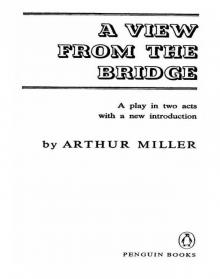 A View From the Bridge: A Play in Two Acts
A View From the Bridge: A Play in Two Acts Broken Glass
Broken Glass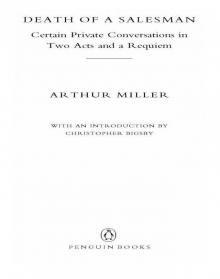 Death of a Salesman
Death of a Salesman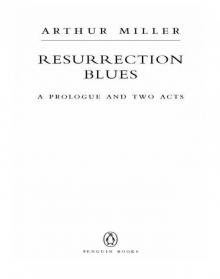 Resurrection Blues
Resurrection Blues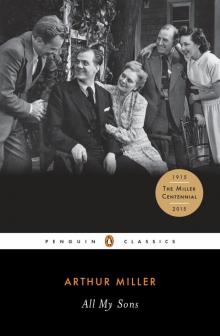 All My Sons
All My Sons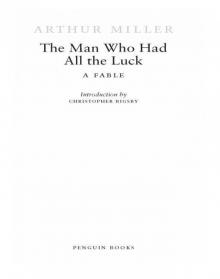 The Man Who Had All the Luck
The Man Who Had All the Luck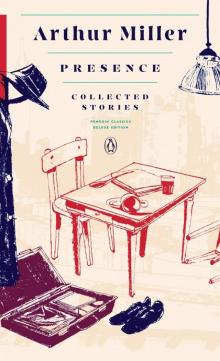 Presence: Stories
Presence: Stories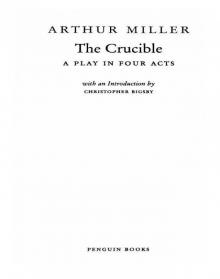 The Crucible
The Crucible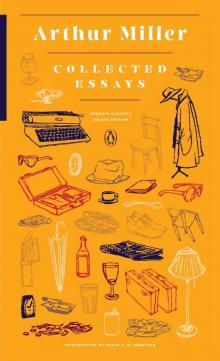 Collected Essays
Collected Essays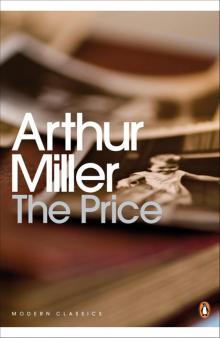 The Price
The Price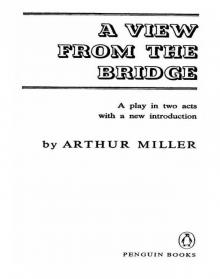 A View from the Bridge
A View from the Bridge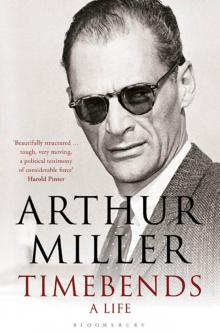 Timebends
Timebends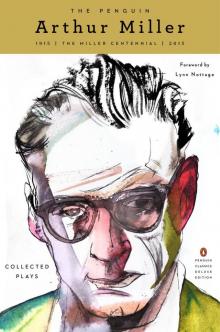 The Penguin Arthur Miller
The Penguin Arthur Miller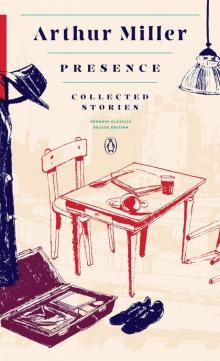 Presence
Presence